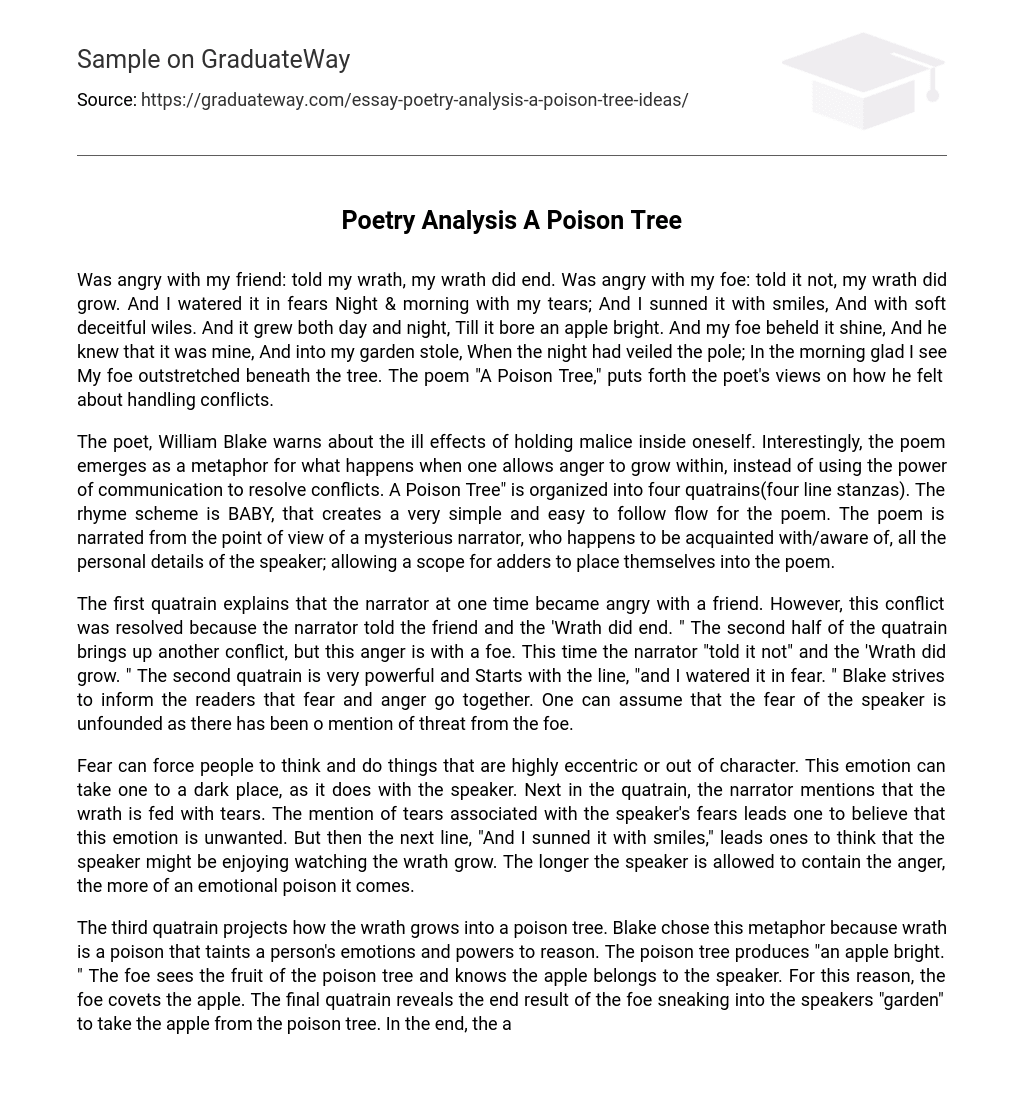Was angry with my friend: told my wrath, my wrath did end. Was angry with my foe: told it not, my wrath did grow. And I watered it in fears Night & morning with my tears; And I sunned it with smiles, And with soft deceitful wiles. And it grew both day and night, Till it bore an apple bright. And my foe beheld it shine, And he knew that it was mine, And into my garden stole, When the night had veiled the pole; In the morning glad I see My foe outstretched beneath the tree. The poem “A Poison Tree,” puts forth the poet’s views on how he felt about handling conflicts.
The poet, William Blake warns about the ill effects of holding malice inside oneself. Interestingly, the poem emerges as a metaphor for what happens when one allows anger to grow within, instead of using the power of communication to resolve conflicts. A Poison Tree” is organized into four quatrains(four line stanzas). The rhyme scheme is BABY, that creates a very simple and easy to follow flow for the poem. The poem is narrated from the point of view of a mysterious narrator, who happens to be acquainted with/aware of, all the personal details of the speaker; allowing a scope for adders to place themselves into the poem.
The first quatrain explains that the narrator at one time became angry with a friend. However, this conflict was resolved because the narrator told the friend and the ‘Wrath did end. ” The second half of the quatrain brings up another conflict, but this anger is with a foe. This time the narrator “told it not” and the ‘Wrath did grow. ” The second quatrain is very powerful and Starts with the line, “and I watered it in fear. ” Blake strives to inform the readers that fear and anger go together. One can assume that the fear of the speaker is unfounded as there has been o mention of threat from the foe.
Fear can force people to think and do things that are highly eccentric or out of character. This emotion can take one to a dark place, as it does with the speaker. Next in the quatrain, the narrator mentions that the wrath is fed with tears. The mention of tears associated with the speaker’s fears leads one to believe that this emotion is unwanted. But then the next line, “And I sunned it with smiles,” leads ones to think that the speaker might be enjoying watching the wrath grow. The longer the speaker is allowed to contain the anger, the more of an emotional poison it comes.
The third quatrain projects how the wrath grows into a poison tree. Blake chose this metaphor because wrath is a poison that taints a person’s emotions and powers to reason. The poison tree produces “an apple bright. ” The foe sees the fruit of the poison tree and knows the apple belongs to the speaker. For this reason, the foe covets the apple. The final quatrain reveals the end result of the foe sneaking into the speakers “garden” to take the apple from the poison tree. In the end, the apple, the fruit of speaker’s wrath, takes the life of the foe.
The speaker is victorious over the foe but at an unanticipated, exorbitant price. Blake says that the speaker is “glad” to see the foe “outstretched beneath the tree. ” These last lines pose a kind of turbulent and unnerving scenario. No matter what the anger- poisoned speaker may believe, this is not a victory. “A Poison Tree” is Flake’s warning to the readers about what unchecked anger can do. Such an emotion can become poison to people’s minds if allowed to grow. Communication and releasing such emotions before they fester is the safest path to resolve conflict.





